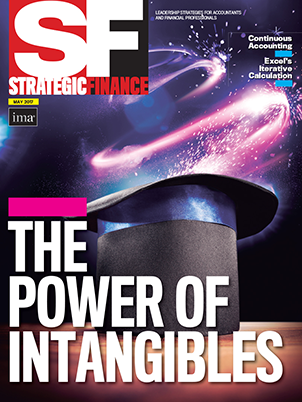In April 2017, IMA® (Institute of Management Accountants) announced an exciting new certification, CSCA™ (Certified in Strategy and Competitive Analysis). Earning this certification will enhance your strategic management skills, expand your credentials, and position you for broader management responsibilities. If you are considering entering the program, this is the time to start thinking about assembling your study plan since exam registration opens (www.imanet.org/csca) at the end of this month.
Before we review exam preparation options, let’s quickly take a look at the exam itself.
EXAM FORMAT
The three-hour CSCA exam incorporates 60 multiple-choice questions and one case study. The case scenario describes an organization that faces a strategic decision (or several, in some cases). Candidates are asked to respond to a series of questions to demonstrate their understanding of the CSCA body of knowledge and their ability to analyze and synthesize business information and effectively communicate analysis and recommendations.
Questions span the range of cognitive levels A, B, and C:
Level A. Requiring the skill levels of knowledge and comprehension.
Level B. Requiring the skill levels of knowledge, comprehension, application, and analysis.
Level C. Requiring all six skill levels: knowledge, comprehension, application, analysis, synthesis, and evaluation.
RESOURCES
Your unique background—in terms of both education and experience—warrants a custom study plan that’s tailored to best match your specific training needs. Here are a few general tips for putting a plan in place:
- Familiarize yourself with the CSCA Content Specification Outline (CSO), which is shown online at http://bit.ly/2oDP6lF and in “Get the CSCA Credential to Accelerate Career Growth” in the April 2017 issue of Strategic Finance. This will provide an overview of the content areas that must be mastered in order to excel on exam day.
- Then take a look at the detailed Learning Outcome Statements (LOS) to determine those topics for which you’ll need further study. This will assist you in mapping out how to best budget your study time. Note that some portions of the subject matter will be familiar since certain aspects also appear on the CMA exam. The LOS can be found on the CSCA section of the IMA website (http://bit.ly/2oDP6lF).
- You’ll now be ready to review the other resources (listed next) and accelerate your exam preparation process.
IMA STRATEGY AND COMPETITIVE ANALYSIS LEARNING SERIES™
Once you register for the program, you also will be able to benefit from the enriched overview of the strategic management process that’s provided in IMA’s Strategy and Competitive Analysis Learning Series. These five engaging online self-study courses have been designed to present the topics covered on the CSCA exam, including strategy development, competitive analysis, strategy implementation, and performance evaluation. In addition, these fully narrated courses include interactive exercises, knowledge check questions, and outside readings to deepen understanding of important concepts. Classic articles from the required HBR’s 10 Must Reads on Strategy are also incorporated into the lessons. You can stop and restart a course as your schedule dictates. Successful completion of each course, including a final assessment, will also qualify for NASBA-approved CPE credits.
As an added benefit, IMA’s Strategy and Competitive Analysis Learning Series also features a question bank with CSCA exam-style multiple-choice and case-study questions. The multiple-choice questions will be presented in randomized groupings. Over time, more practice questions will be added to the question bank to help course takers self-assess comprehension.
CSCA READING LIST
You should also scan the CSCA Reading List, which has numerous resources that provide in-depth explanations of the body of knowledge. Depending on your education and experience, you may choose to incorporate one (or more) of the strategy textbooks noted on the Reading List into your preparation plan. The Reading List also includes management accounting and finance textbooks and IMA Statements on Management Accounting that can be woven into a personalized preparation plan. The CSCA Ratio & Formula Definitions document details the standardized formulas that should be utilized when taking the CSCA exam.
CSCA RESOURCE GUIDE
The CSCA Resource Guide complements the recommended strategy textbooks. Check the Resource Guide to easily find the relevant chapters that cover the material in each section of the CSO. In this way, you can focus your efforts and use your time efficiently. As you can see, there are abundant resources to select from when developing your exam study plan. Devoting a small amount of up-front time to assessing how your knowledge lines up with the content areas, putting a tailored plan in place, and leveraging the resources available to you can lead to big rewards later. Good luck with your studies and sitting for the CSCA exam!
For an in-depth description of the topics covered on the exam, please visit the complete CSCA Content Specification Outline at http://bit.ly/2oDP6lF.
ABOUT THE CSCA
ICMA® (Institute of Certified Management Accountants) has designed the CSCA™ (Certified in Strategy and Competitive Analysis) certification, a program that complements the CMA® (Certified Management Accountant) certification.
The first in an upcoming series of specialty credentials, the CSCA certification builds on planning, analysis, risk management, decision support, and performance management skills by strengthening a person’s knowledge base in the specific discipline of strategic planning. Holders of this valuable certification will be more equipped to drive strategic planning, enable innovation, build resilient financial plans, and manage risk to help their organizations sustain a competitive advantage.
The three-hour CSCA exam, which will be offered during the months of March and September in a computer-based format beginning September 1, 2017, consists of 60 multiple-choice questions and one case study. Candidates won’t receive immediate pass/fail results because the case will be graded offline by graders. To be eligible to take the CSCA exam, you must be an Active CMA or CFM® (Certified Financial Manager). To be certified, you need to pass the CSCA exam and maintain Active status as a CMA or CFM. Be sure to register (www.imanet.org/csca) in late May.

May 2017



